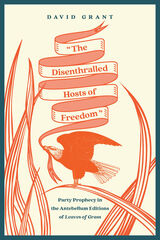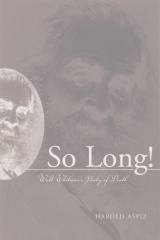
Anti-slavery party discourse set itself the task of curing an ailing people who had grown compliant, inert, and numb; it fashioned a complete fictional world where the people could be reactivated into assuming their true role in the republic. Both as a cause and a result of this rejuvenation, they would come into their own and spread their energies over the land and over the body politic, thereby rescuing their country at the last minute from what would otherwise be the permanent dominion of slavery. Party discourse had long hinged its success on such magical transformations of the people individually and collectively, and Whitman’s celebrations of his nation’s potential need to be seen in this context: like his party, Whitman calls on the people to reject their own subordination and take command of the future, and redeem themselves as they also redeem the nation.

Within twelve years of the first appearance of Leaves of Grass in 1855, Walt Whitman produced three other editions of what he insisted were the “same” work; two more followed later in his life. Rather than asking which of these editions is best, Michael Moon, in Disseminating Whitman, argues that the very existence of distinct versions of the text raises essential questions about it. Interpreting “revision” more profoundly than earlier Whitman critics have done, while treating the poet’s homosexuality as a cultural and political fact rather than merely as a biographical datum, Moon shows how Whitman’s continual modifications of his work intersect with the representations of male-male desire throughout his writing. What is subjected to endless revision throughout the first four editions of Leaves of Grass, Moon argues, is a historically specific set of political principles governing how the human body—Whitman’s avowed subject—was conceptualized and controlled in mid-nineteenth-century America.
Moon interprets Whitman’s project as one that continually engages in such divergent contemporaneous discourse of the body as the anti-onanist ones of the “male-purity” movement, anti-slaver writing, “temperance” tracts, and guides to conduct for the aspiring “self-made man.” Critically applying various interpretive models from psychoanalysis, literary and cultural theory, and gender studies, and heeding recurring patterns of language and figure, Moon provides rigorous intertextual readings of Whitman’s canon. Ingeniously employing “The Child’s Champion” as a paradigm, Moon scrutinizes such celebrated poems as “Song of Myself” and the great Civil War elegies, as well as such commonly overlooked poems as “Song of the Broad-Axe” and “Song of the Banner at Daybreak.”
Disseminating Whitman reveals as no previous study has done the poet’s fervent engagement with the most highly charged political questions of his day—questions of defining and regulating whole ranges of experiences and desires that remain the subject of intense political conflict in our own time. This radical reassessment of the “good gray” poet makes a definitive contribution to critical work in American history and literature, poetry, and gender studies.

Walt Whitman is unquestionably a great poet of the joys of living. But as Harold Aspiz demonstrates in this study, concerns with death and dying define Whitman’s career as a thinker, a poet, and a person. Through a close reading of Leaves of Grass, its constituent poems, particularly “Song of Myself,” and Whitman’s prose and letters, Aspiz charts how the poet’s exuberant celebration of life—the cascade of sounds, sights, and smells that erupt in his verse—is a consequence of his central concern: the ever-presence of death and the prospect of an afterlife.
Until now no one has studied as systematically the degree to which mortality informs Whitman’s entire enterprise as a poet. So Long! devotes particular attention to Whitman’s language and rich artistry in the context of the poet’s social and intellectual milieus. We see Whitman (and his many personae) as a folk prophet announcing a gospel of democracy and immortality; pondering death in alternating moods of acceptance and terror; fantasizing his own dying and his postmortem selfhood; yearning for mates and lovers while conscious of fallible flesh; agonizing over the omnipresence of death in wartime; patiently awaiting death; and launching imaginary journeys toward immortality and godhood.
So Long! is valuable for American literature collections, students and scholars of Whitman and 19th-century literature, and general readers interested in Whitman and poetry. By exploring Whitman's faith in death as a meaningful experience, we may understand better how the poet—whether personified as representative man, victim, hero, lover, or visionary—lived so completely on the edge of life.
READERS
Browse our collection.
PUBLISHERS
See BiblioVault's publisher services.
STUDENT SERVICES
Files for college accessibility offices.
UChicago Accessibility Resources
home | accessibility | search | about | contact us
BiblioVault ® 2001 - 2024
The University of Chicago Press









